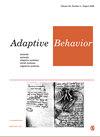因果心理:一种基于可供性的因果参与解释
IF 1.3
4区 计算机科学
Q4 COMPUTER SCIENCE, ARTIFICIAL INTELLIGENCE
引用次数: 0
摘要
因果认知是我们如何处理世界的一个核心方面;然而,现有的心理学理论往往不针对日常生活中的直觉因果参与。为了填补这一空白,我们提出了一种基于生态行为(E-E)可供性的情境因果参与解释,即因果判断和感知。我们开发这个账户是为了提高我们对这种处理世界的方式的理解,包括在因果选择问题上取得进展,并将具体认知科学的范围扩展到因果认知。我们将识别原因描述为选择性地关注相关的生态信息以参与相关的可供性,其中这些可供性取决于个人能力。基于此,我们将因果关系理解为基于习得的技能。此外,我们认为,要理解我们在日常生活中对因果关系的判断,我们需要将其视为社会文化实践中的因果关系。实践是关于做的,因此这种观点有助于我们理解为什么人们会如此普遍地做出这些判断:完成事情,为干预世界提供一条有效的途径。最终,这种关于因果参与的观点使我们能够通过利用学习技能和社会文化实践的差异来解释因果认知、判断和选择中的个体差异。本文章由计算机程序翻译,如有差异,请以英文原文为准。
The causal mind: An affordance-based account of causal engagement
Causal cognition is a core aspect of how we deal with the world; however, existing psychological theories tend not to target intuitive causal engagement that is done in daily life. To fill this gap, we propose an Ecological-Enactive (E-E) affordance-based account of situated causal engagement, that is, causal judgments and perceptions. We develop this account to improve our understanding of this way of dealing with the world, which includes making progress on the causal selection problem, and to extend the scope of embodied cognitive science to causal cognition. We characterize identifying causes as selectively attending to the relevant ecological information to engage with relevant affordances, where these affordances are dependent on individual abilities. Based on this we construe causal engagement as based on a learned skill. Moreover, we argue that to understand judgments of causation as we make them in our daily lives, we need to see them as situated in sociocultural practices. Practices are about doing, and so this view helps us understand why people make these judgments so ubiquitously: to get things done, to provide an effective path to intervening in the world. Ultimately this view on causal engagement allows us to account for individual differences in causal perceptions, judgments, and selections by appealing to differences in learned skills and sociocultural practices.
求助全文
通过发布文献求助,成功后即可免费获取论文全文。
去求助
来源期刊

Adaptive Behavior
工程技术-计算机:人工智能
CiteScore
4.30
自引率
18.80%
发文量
34
审稿时长
>12 weeks
期刊介绍:
_Adaptive Behavior_ publishes articles on adaptive behaviour in living organisms and autonomous artificial systems. The official journal of the _International Society of Adaptive Behavior_, _Adaptive Behavior_, addresses topics such as perception and motor control, embodied cognition, learning and evolution, neural mechanisms, artificial intelligence, behavioral sequences, motivation and emotion, characterization of environments, decision making, collective and social behavior, navigation, foraging, communication and signalling.
Print ISSN: 1059-7123
 求助内容:
求助内容: 应助结果提醒方式:
应助结果提醒方式:


